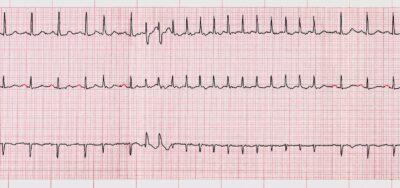
Irregular heart rhythms (arrhythmias) are cause for concern. Atrial fibrillation (AFib) can lead to fatigue, dizzy spells, shortness of breath and a heart flopping feeling. If uncontrolled, AFib can lead to stroke. Some drugs increase the risk for AFib. Are low vitamin D levels also a risk for atrial fibrillation?
How Would You Know If You Have AFib?
There are now devices such as smart watches or portable heart monitors that can help diagnose this arrhythmia. They’re not perfect, though. An electrocardiogram is a more accurate reflection of heart rhythms.
Anyone with persistent symptoms should be evaluated by a physician. If an Apple Watch detects AFib, a doctor should be consulted.
What Triggers AFib?
A number of medications can increase the risk for atrial fibrillation. Millions of people take corticosteroids (cortisone-type drugs like prednisone) to control inflammation. Tens of millions more take NSAIDs like celecoxib, diclofenac, ibuprofen, meloxicam and naproxen to ease pain. These kinds of medications can put people at greater risk for atrial fibrillation.
PPIs for heartburn may deplete the body of minerals such as magnesium. That too ups the risk for atrial fibrillation. You can read more about pharmaceuticals that could pose problems for this irregular heart rhythm at this link.
Is Your Medicine Triggering Scary Atrial Fibrillation (AFib)?
Atrial fibrillation (AFib) is a potentially life-threatening irregular heart rhythm. A surprising number of medications can trigger this arrhythmia.
Can Natural Approaches Lower Your Risk for Atrial Fibrillation?
Q. I have COPD and an abnormal heart rhythm (AFib). I quit coffee because I read it could trigger AFib. Instead, I start my day with hot water and lemon juice. I also quit drinking alcohol to reduce AFib.
I am trying to increase my exercise bit by bit. Also, I am hoping the lemon water will lower my blood pressure. After two months on lemon water, it’s been around 125/70. I also have incorporated beets into my diet. They are high in nitrate so I am trusting they will also help me control my blood pressure.
Despite COPD, thyroid disease and pulmonary arterial hypertension, I am doing pretty well. I am working with my doctor and hope to rely more on natural foods. Is there any advice you can give me?
A. We applaud your determination to control your abnormal heart rhythm and your blood pressure. Your doctors need to monitor your progress and help you prevent blood clot formation that might cause a stroke.
Coffee Is Confusing:
Researchers admit that the relationship between coffee and atrial fibrillation is confusing. Some studies suggest that coffee consumption increases the risk for arrhythmias while others indicate that it is protective (Nutrients, Aug. 2023).
Could Lemon and Beet Juice Help?
Low-sugar fruit juices such as lemon juice appear to have a beneficial impact on the heart and can improve exercise performance (Nutrition Research Reviews, Sept 1, 2023). A study in the European Respiratory Journal (Dec. 20, 2023) found that nitrate-rich beet juice lowers systolic blood pressure and improves blood vessel flexibility in patients with COPD (chronic obstructive pulmonary disease). It was also shown to improve exercise capability.
Is Vitamin D Deficiency a Risk for Atrial Fibrillation?
Q. I was diagnosed with paroxysmal atrial fibrillation years ago and have taken propafenone SR every day since. If the AFib pops up from time to time despite the propafenone SR, I take a lower-dose regular propafenone tablet. That usually works in about 30 minutes.
In 2020, I needed these rescue tablets more frequently, from an average of two per week to almost five a week in the fall. After the election, it dropped back down. Since then, I’ve been averaging one a week.
I attribute that spike to work stress and political turmoil. The drop might be due in part to less work pressure and the less intense political situation.
One other factor may be playing a role in my reduced AFib episodes. On December 16, my new primary care physician put me on 2,000 IU vitamin D3 daily. Could vitamin D3 play a role in reducing periods of AFib?
A. You’ve suggested an intriguing possibility. Adequate vitamin D levels might indeed reduce the likelihood of atrial fibrillation.
Studies on Vitamin D and AFib:
One analysis of 13 studies concluded that vitamin D deficiency was associated with an increased risk of atrial fibrillation (Nutrition Journal, Nov. 14, 2019). A randomized controlled trial found that high-dose short-term vitamin D supplements helped prevent A-Fib after coronary bypass surgery (General Thoracic and Cardiovascular Surgery, May, 2020).
One of the reasons doctors worry about atrial fibrillation is that patients have an increased possibility of blood clotting when it is not moving properly through all the heart’s chambers. One study recruited 200 people with A-Fib taking anticoagulants to prevent clots (Nutrition, Metabolism, and Cardiovascular Diseases, June 25, 2020). Those with low levels of 25-hydroxyvitamin D were more likely to develop a clot anyway. Such clots are especially dangerous because they can move into the brain and cause strokes.
This research adds weight to the importance of knowing your vitamin D level. To learn more about this crucial nutrient, you may want to read our eGuide to Vitamin D and Optimal Health. This electronic resource may be found in the Health eGuides section of this website.
Share Your Own AFib Story:
Let others know what it’s like to have atrial fibrillation in the comment section below. How have you controlled it?



Julie
I’ve had A-fib for many years. I’ve had both low and high Vitamin D readings. Because I have heart valve issues, I take warfarin and a calcium channel blocker. I used to take Aleve for arthritis, but am now taking high doses of curcumin and eat an anti-inflammatory diet to relieve pain. I only need to take tylenol occasionally. I had reclast infusions during this time too.
Four and a half years ago I had a cardiac ablation. While it did not “cure” the A-fib, it did make it less of a problem. I also take calcium citrate, vitamin D and magnesium.
Sometimes you just have to live with it.
Mona T
A study comparing irregular heartbeat among people in other countries would be very interesting, especially considering that the US and New Zealand are the only countries that allow pharmaceutical advertising. I firmly believe these issues with Afib, as well as autoimmune issues, are solely from the body’s adaptation to toxicity and mineral deficiencies…period.
Kristine
I was diagnosed with a-fib several years ago (my dad had it and my brother has it). When I had my first very bad episode I went to the doc and she did an EKG an immediately called 911. In the emergency department I waited for SIX hours, sweating and feeling horrible. Finally, the docs kept me in the hospital for a week and monitored me after putting me on FLECANIDE. When I was sent home I wore a monitor for six weeks. The med works great. I have a lot of palpitations but they are benign. I take 5000 IU of D3 daily.
Beda
Most of my family — two sisters, a niece and son all have afib. My sisters and I developed it at about 60 years of age. My niece and son have had episodes & these started in their 50’s. It seems that there is a genetic component within our family that predisposes us to afib.
Monica
I appreciate this forum of sharing and hearing others afib stories. I can sense that each person is so unique, so the imbalance, which I call the afib that put me in the hospital and on Eliquis/Sotalol seems to have helped, but I also sense there is more to the story. I believe the body wants to heal and there are many modalities to get there, but it is a journey and the healing needs to be fine-tuned to each individual. I have no answers, but I do trust we will/are evolving into more wholistic ways of working with our imbalances on mental, spiritual and physical levels to find healing. These will
lead to a better way of being in the cycle of life.
Elisabeth
Too much thyroid medication gave me A-fib. After eleven visits to the ER they kept me overnight so I could see the cardiologist in the morning. He wrote to my family physician and endocrinologist and said they should pay attention to my readings, each of which showed overdose. Once I got down to the dose he recommended, I was so much better and have remained so.
Jackie
I have AFib which is “monitored” by a pacemaker. This helps me identify both triggers and things that help keep it in control. I find the best help is a cannabis tincture that is very high in CBD 30:1. I live in California so I have legal access. When I’m not able to take it due to being out of state, my % of events goes way up, from 2% to 16%.
I also have good D3 levels, take 5,000IU/day. My # is always around 70, and I take 450 magnesium daily.
I am on Eliquis and Sotalol.
Barbara
I was diagnosed with osteoporosis, and my doctor recommended that I take 1000 mg calcium without explaining what kind of calcium; said that I should also take magnesium and that I should include the amount of total calcium in my diet. After several weeks, I was noticing that at night and upon awakening my heart palpitations were irregular and very noticeable. It took several days for me to understand it had to do with taking calcium, not calcium citrate, and that I needed to also take magnesium. I was scared to death.
Terry
I was diagnosed with Afib after wearing a Holter monitor for 30 days. I was put on Eliquis and after 10 months I woke up with excruciating pain in my groin and down my left thigh. Eliquis caused bleeding in my back which was bleeding into my thigh. It happened 3 times. I just had the Watchman procedure and am on aspirin and plavix for a period of time. Since these are blood thinners I still have the fear of internal bleeding.
Beverly
My computerized watch notified me that it detected aFib. I thought the cardiologist might think I was nuts, but made an appointment anyway. After wearing a monitor for 2 weeks and having an echocardiogram of my heart, my doctor informed me that I do, indeed, have aFib. I added Vitamin D3 shortly before my diagnosis. My last Synthroid prescription was filled with the generic, which I’ve never had before. Wondering if that could be a factor as well.
K
A trigger for my a-fib is quinine such as in tonic water.
Caroline
My heart doctor says I have irregular heartbeat, not Afib, and I am on Metoprolol and Losartan. But the irregular beats feel like the listed symptoms of Afib. The medications control it most of the time but I do have occasional episodes. After a week of sporadic episodes, calling my doctor, googling Afib, and reading People’s Pharmacy, I started taking Vitamin D. I also added Calcium, magnesium, and iodine. My doctor approved, as long as I do not take more than the recommended amounts.
Now a month later I have very few episodes of irregular heartbeat and they don’t last long. Several years ago, my Vitamin D level were checked and found to be low, but not out of the normal range. Is it possible the combination of Vitamin D, calcium, magnesium, and iodine are helping? Could a deficiency or low amounts of these cause irregular heartbeats? Can I continue to safely take these supplements along with my prescription medications? I visit the doctor every 6 months to monitor, and wonder if he is knowledgeable enough about nutritional issues.
Gary
I have afib and high Vit-D levels.